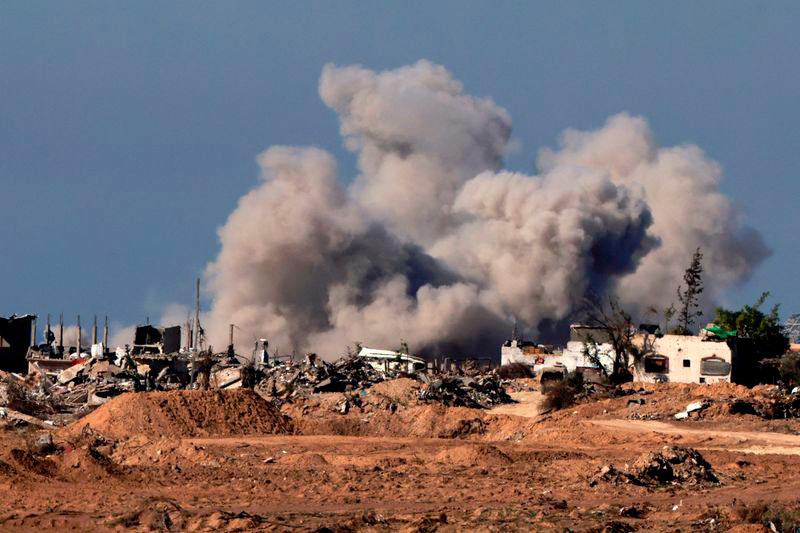RAFAH: Israel and Hamas, engaged in heavy fighting in the Gaza Strip, both angrily rejected on Monday moves to arrest their leaders for war crimes made before an international court.
The International Criminal Court's prosecutor Karim Khan said he had applied for arrest warrants for top Israeli and Hamas leaders over the conflict.
Israel slammed as a “historical disgrace” the demand targeting Prime Minister Benjamin Netanyahu and Defence Minister Yoav Gallant, while the Palestinian militant group Hamas said it “strongly condemns” the move.
Israel's top ally the United States joined the condemnation, while France said it supported the court’s independence and its “fight against impunity”.
Netanyahu said he rejected “with disgust The Hague prosecutor's comparison between democratic Israel and the mass murderers of Hamas”.
Khan said in a statement that he was seeking warrants against the Israeli leaders for crimes including “wilful killing”, “extermination and/or murder”, and “starvation”.
He said Israel had committed “crimes against humanity” during the war, started by Hamas’s unprecedented October 7 attack, as part “of a widespread and systematic attack against the Palestinian civilian population”.
Khan also said the leaders of Hamas, including Qatar-based Ismail Haniyeh and Gaza chief Yahya Sinwar, “bear criminal responsibility” for actions committed during the October 7 attack.
These included “taking hostages”, “rape and other acts of sexual violence”, and “torture”, he said.
“International law and the laws of armed conflict apply to all,“ Khan said. “No foot soldier, no commander, no civilian leader -- no one -- can act with impunity.”
The warrants, if granted by the ICC judges, would mean that any of the 124 ICC member states would technically be obliged to arrest Netanyahu and the others if they travelled there, a point noted by EU foreign policy chief Josep Borrell.
However, the court has no mechanism to enforce its warrants.
US President Joe Biden denounced the ICC bid as “outrageous” and said “there is no equivalence -- none -- between Israel and Hamas”.
Germany agreed, with a foreign ministry spokesman saying the warrants gave “a false impression of equivalence”.
Biden also rejected accusations in a separate tribunal, the UN International Court of Justice, where South Africa has alleged that Israel's war in Gaza is genocidal.
“What’s happening is not genocide,“ Biden told a Jewish American Heritage Month event at the White House on Monday.
South Africa welcomed the move at the ICC.
'Where will we go?'
The war ground on unabated, with Israeli forces battling Hamas in Gaza's far-southern city of Rafah, as well as in other flashpoints in central and northern areas.
Israel defied international opposition almost two weeks ago when it sent troops into Rafah, which is crowded with civilians and which the military has described as the last Hamas stronghold.
Netanyahu has vowed to keep fighting Hamas in Gaza until the Iran-backed Islamist group is defeated and all remaining hostages are released.
The United Nations said more than 812,000 Palestinians had fled Rafah, near the Egyptian border.
“The question that haunts us is: where will we go?” said Sarhan Abu al-Saeed, 46, a desperate Palestinian resident. “Certain death is chasing us from all directions.”
Witnesses told AFP that Israeli naval forces had also struck Rafah, and medics reported an air strike on a residential building in the city's west.
The military said Israeli troops were “conducting targeted raids on terrorist infrastructure” in eastern Rafah, where they had found “dozens of tunnel shafts” and “eliminated over 130 terrorists”.
'On verge of collapse'
The war broke out after Hamas's October 7 attack on Israel, which resulted in the deaths of more than 1,170 people, mostly civilians, according to an AFP tally based on Israeli official figures.
Hamas also took about 250 hostages during the attack, of whom 124 remain in Gaza including 37 the army says are dead.
Israel's retaliatory offensive against Hamas has killed at least 35,562 people in Gaza, also mostly civilians, according to the Hamas-run territory's health ministry.
The Israeli military said on Monday the bodies of four hostages retrieved from Gaza last week had been found in tunnels under Jabalia in the north.
Israeli forces have been fighting in northern and central areas previously declared largely cleared of militants, with the military saying its troops had killed 200 militants in Jabalia.
Israel has imposed a siege on the long-blockaded Gaza Strip, depriving its 2.4 million people of normal access to clean water, food, medicines and fuel.
The suffering has been eased only by sporadic aid shipments by land, air and sea, but truck arrivals have slowed to a trickle amid the Rafah operation.
The European Union warned that 31 of Gaza‘s 36 hospitals are no longer functioning and that the rest are “on the verge of collapse, with more than 9,000 severely injured people at risk of dying”.
Air strikes continued across Gaza, including on Gaza City in the north, the military said.
Gaza's civil defence said the bodies of eight dead, along with several wounded, were retrieved after an air strike on the Sheikh Radwan neighbourhood of Gaza City.
US National Security Advisor Jake Sullivan met Netanyahu on Sunday and told him Israel must link the military operation against Hamas with a “political strategy” for Gaza's future.
Washington has pushed for a post-war plan for Gaza involving Palestinians and supported by regional powers, as well as for a broader diplomatic deal under which Israel and Saudi Arabia would normalise relations.









